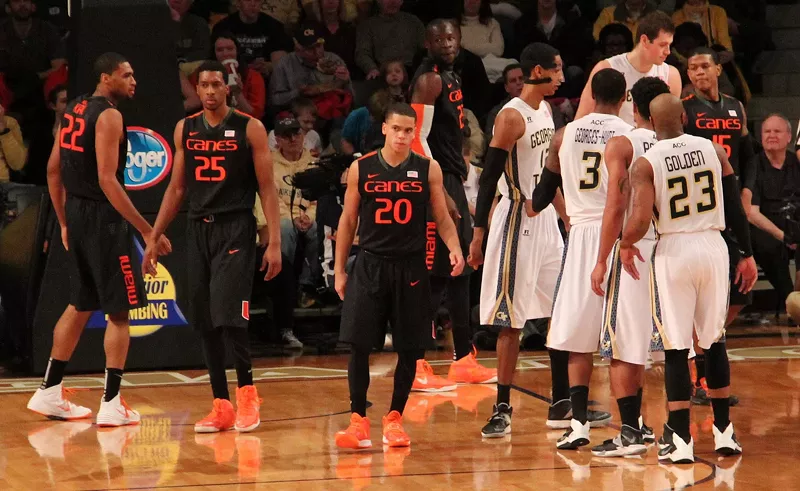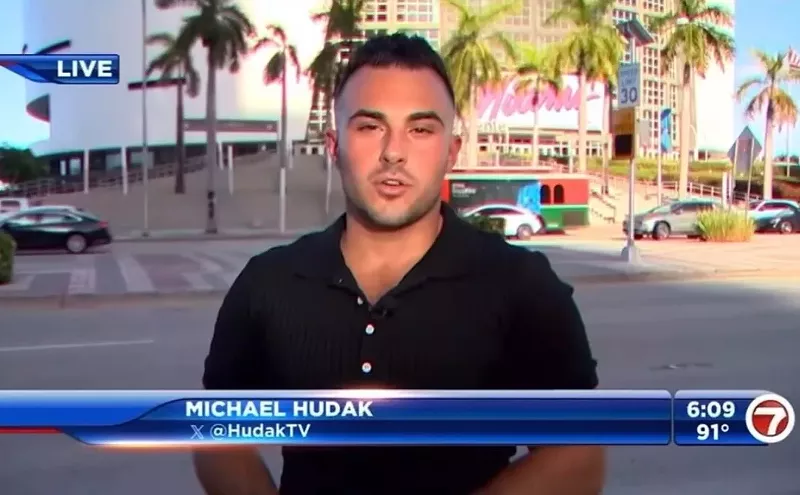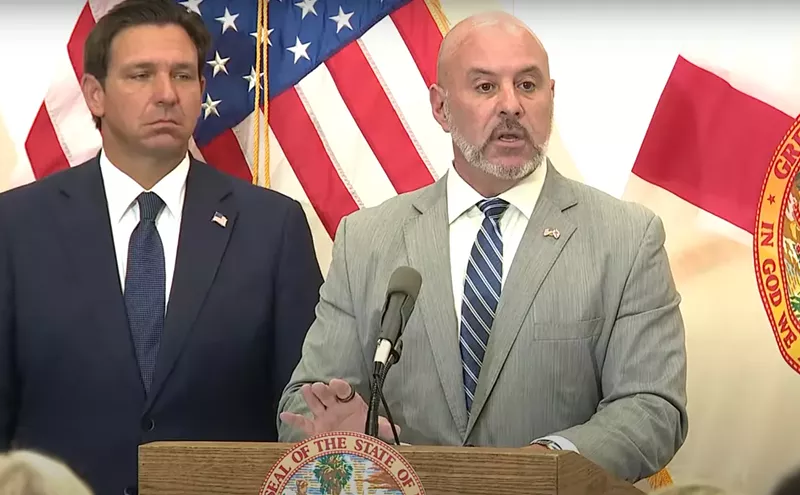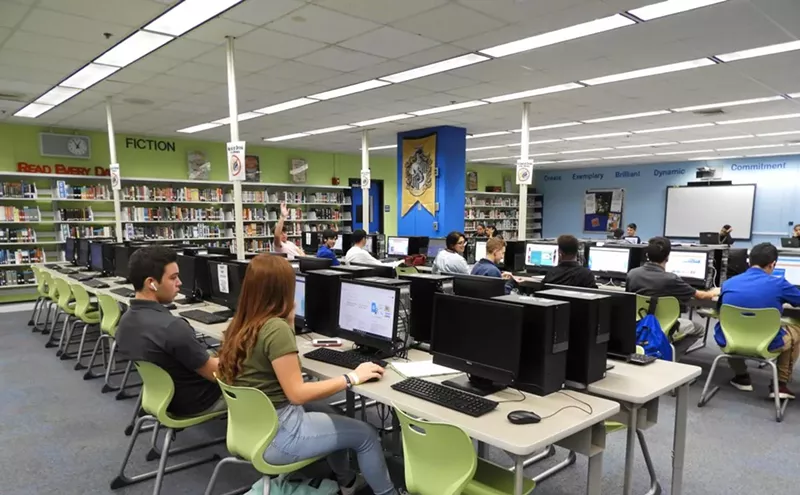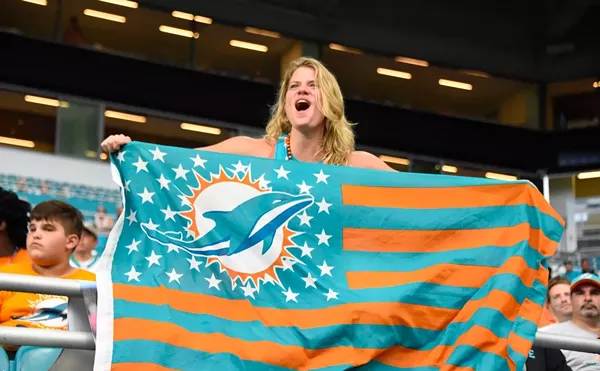On Tuesday, the FBI unsealed indictments against 10 people, including Adidas officials and multiple National Collegiate Athletic Association coaches. The FBI says Adidas executive James Gatto illegally funneled hundreds of thousands of dollars to high school recruits, so long as those recruits agreed to attend Adidas-sponsored universities. The FBI initially said an anonymous "Coach 3" at an unnamed, "private Florida university with roughly 16,000 students and an Adidas sponsorship deal" had directed the apparel company to pay a recruit $150,000 under-the-table.
While Larrañaga's lawyer says the coach has no idea what the FBI is talking about, UM President Julio Frenk publicly confirmed that the FBI was referring to the Hurricanes. The scandal has likely cost Louisville Men's Basketball Coach Rick Pitino is job — with more indictments rumored to be coming soon, it's hard not to wonder how much Larrañaga really knows.
But Hurricane fans have certainly been here before. So much so, in fact, that New Times has compiled a handy timeline of some of the more recent sports-corruption allegations at the school, which mostly date from the time Ponzi schemer Nevin Shapiro nearly got the entire football program shut down.
1. In 1995, the NCAA unveils blockbuster sanctions under then-coach Butch Davis, which punish the school for misconduct going back decades:
This then leads Sports Illustrated to write an open letter to the university titled "Broken Beyond Repair: Why Miami should drop football:"
For all its victories, Miami football has been worse in more ways over a longer period of time than any other intercollegiate athletic program in memory. Scan the list of abuses that beset college sports, and your football team can claim, going back to 1980, at least one entry in virtually every category: improper benefits; recruiting violations; boosters run amok; academic cheating; use of steroids and recreational drugs; suppressed or ignored positive tests for drugs; player run-ins with other students as well as with campus and off-campus police; the discharge of weapons and the degradation of women in the football dorm; credit-card fraud and telephone credit-card fraud.(Previously, the 'Canes had only been hit once for recruiting violations in 1981. The 1995 ordeal cost the team 31 scholarships and one postseason berth.)
During the past decade your school enrolled and suited up at least one player who had scored a 200 on his verbal SAT — the number you get for spelling your name correctly. An on-campus disturbance, involving some 40 members of the football team, required 14 squad cars and a police dog to quell. Fifty-seven players were implicated in a financial-aid scandal that the feds call "perhaps the largest centralized fraud upon the federal Pell Grant program ever committed.'' And among numerous cases of improper payments to players from agents was one in which the nondelivery of a promised installment led a Hurricane player to barge into an agent's office and put a gun to his head.
The illegal acts with which your Hurricanes have been charged run the gamut from disorderly conduct and shoplifting to drunken driving, burglary, arson, assault and sexual battery. Surely you read the exhaustive and chilling piece about your football program in The Miami Herald of May 18. That paper's reporters did the math: No fewer than one of every seven scholarship players on last season's team has been arrested while enrolled at your university. No wonder running back Melvin Bratton, a Hurricane from 1983 to '87, when asked what students thought of the team's rap sheet, said, "They're too scared to say anything to us.'' The old jokes — about Miami being the school where they take the team picture from both the front and the side; about the Hurricanes topping every poll from UPI to MCI to FBI — simply aren't funny anymore.
2. Fifteen years later, local huckster Nevin Shapiro pleads guilty to a Ponzi scheme in 2010 and swears he's going to take down the entire UM football program along with him:
Shapiro, meanwhile, hasn't let his time in a New Jersey prison pass quietly. In addition to spewing threatening voice mails from his jail cell, he called the Miami Herald with a big announcement this past August: He's writing a book.
To be titled The Real U: 2001 to 2010. Inside the Eye of the Hurricane, it will bring his once-beloved athletic program to its knees with information on more than 100 athletes who broke NCAA rules, Shapiro promises.
Shapiro seems to feel burned — by his partners, the sports agency that never worked out, and his onetime friends. Now, he's ready to burn them all back. "Once the players turned pro, they turned their back on me. It made me feel like a used friend," he told the Herald.
How much damaging information does he actually have? Only time will tell. NCAA officials told the Herald in August that, if they deem the book legitimate, they'll investigate.
Maria Elena Perez, Shapiro's lawyer, didn't respond to multiple calls and emails from New Times. But his mother, Ronnie, reached in Canada, spoke candidly about the book and her son. "I told him for years he needed to get out of Dade. It's just a little blip on the map full of Cubans... I've hated it for 35 years," she says.
UM should be concerned about her son's book, she says. "There are some people over at UM who are real worried, some really scared people there," she says, chuckling. "He knows some things about some people, I'll tell you that."
3. Shapiro's book actually does cripple UM football, and reveals that the school never really stopped breaking NCAA rules:
While New Times was gathering info on Shapiro, he was apparently busy giving Yahoo! Sports 100 hours of interview time during an 11-month investigation:
A University of Miami booster, incarcerated for his role in a $930 million Ponzi scheme, has told Yahoo! Sports he provided thousands of impermissible benefits to at least 72 athletes from 2002 through 2010.4. The fallout is intense — UM suspends 13 players and later loses scholarships and more post-season slots
In 100 hours of jailhouse interviews during Yahoo! Sports' 11-month investigation, Hurricanes booster Nevin Shapiro described a sustained, eight-year run of rampant NCAA rule-breaking, some of it with the knowledge or direct participation of at least seven coaches from the Miami football and basketball programs. At a cost that Shapiro estimates in the millions of dollars, he said his benefits to athletes included but were not limited to cash, prostitutes, entertainment in his multimillion-dollar homes and yacht, paid trips to high-end restaurants and nightclubs, jewelry, bounties for on-field play (including bounties for injuring opposing players), travel and, on one occasion, an abortion.
The 13 players are not named in the ESPN report. Only 12 were named in the Yahoo! Sports story that blew the lid on possible Nevin Shapiro-linked violations occurring at the program over the past decade. Those players were: Sean Spence, Ray-Ray Armstrong, Marcus Forston, Jacory Harris, Travis Benjamin, Adewale Ojomo, Vaughn Telemaque, JoJo Nicolas,Marcus Robinson, Aldarius Johnson, Olivier Vernon and Dyron Dye.5. And now, it's the men's basketball team's turn:
Several sources are reporting that Jacory Harris and Sean Spence among the players who have been declared ineligible (on the upside: congrats Stephen Morris).
ESPN explains the process like this:
"Under NCAA rules, when a school finds violations have occurred, the athlete typically is declared ineligible and the NCAA begins a reinstatement process. The NCAA will also decide if that player needs to miss any games. And the clock is running. Miami opens the season at Maryland on September 5."
If Miami didn't take this step, and it was found at a later date that players had violated NCAA rules, the NCAA could force the Hurricanes to vacate any wins accumulated with the players on the field.
The FBI's case suggests a massive underground sports-company payment machine, where multiple firms secretly funnel money to recruits on behalf of university programs and coaches. In UM's (alleged) case, the anonymous basketball coach helped Adidas orchestrate the deal just so UM wouldn't lose the recruit to another anonymous university, which had also offered the player $150,000 through a rival athletic company.(Bonus: New Times in 2002 caught former 'Canes football great Andre Johnson — who later became
According to the complaint, the unnamed coach, Gatto, and four other men were caught on wiretaps multiple times last August admitting they were in something of a bidding war over the player.
'[W]e're trying to keep him from going to one of their schools," Code was caught saying. He added that the payments would be sent to the player's family gradually and would not be "all in one lump sum."
Gatto and Code were recorded multiple times saying that anonymous "Coach 3," believed to be a UM official, was pressuring them to funnel cash to the player.
"[University 7] wants this kid named [Player 12]," the men were caught on tape admitting

